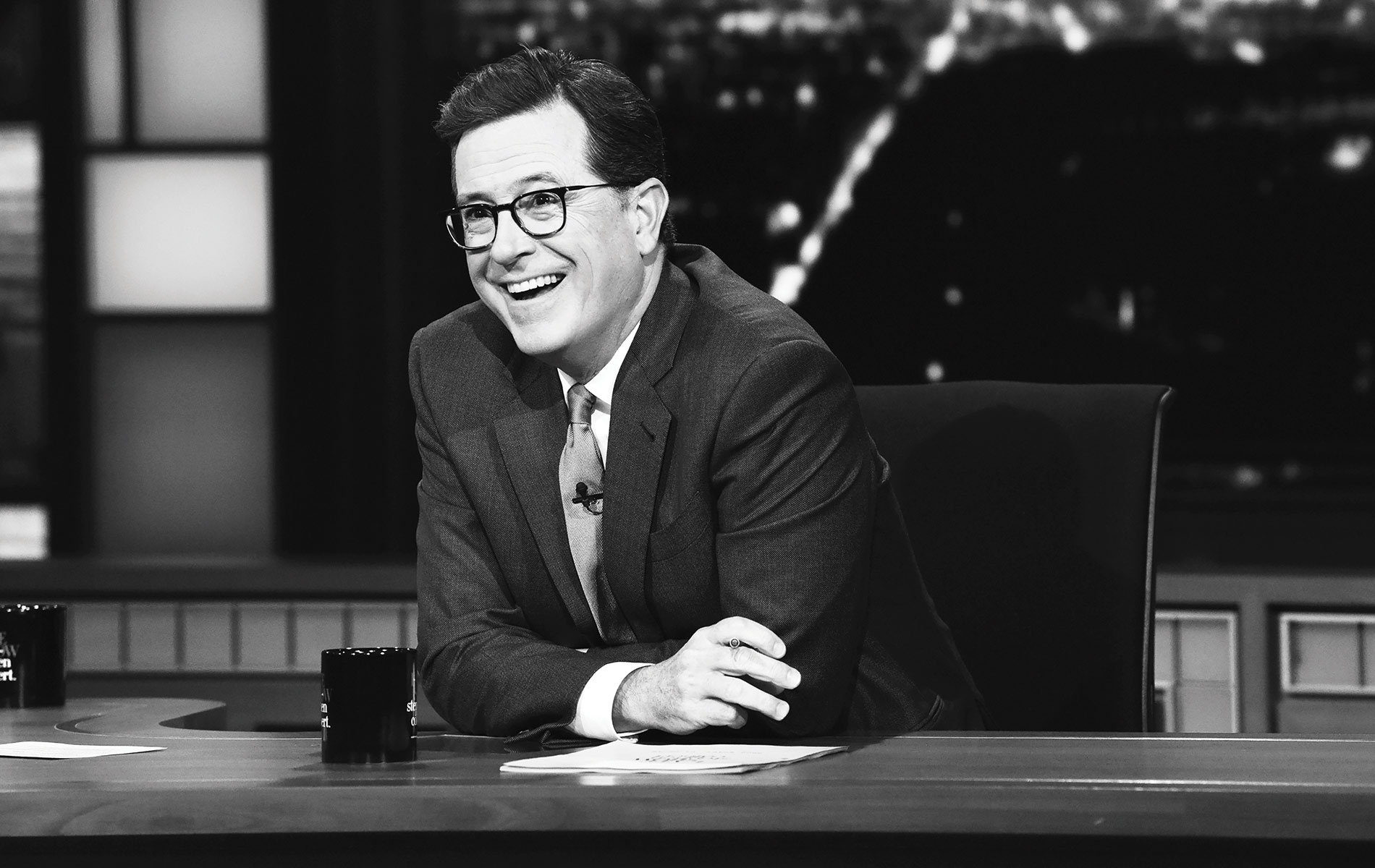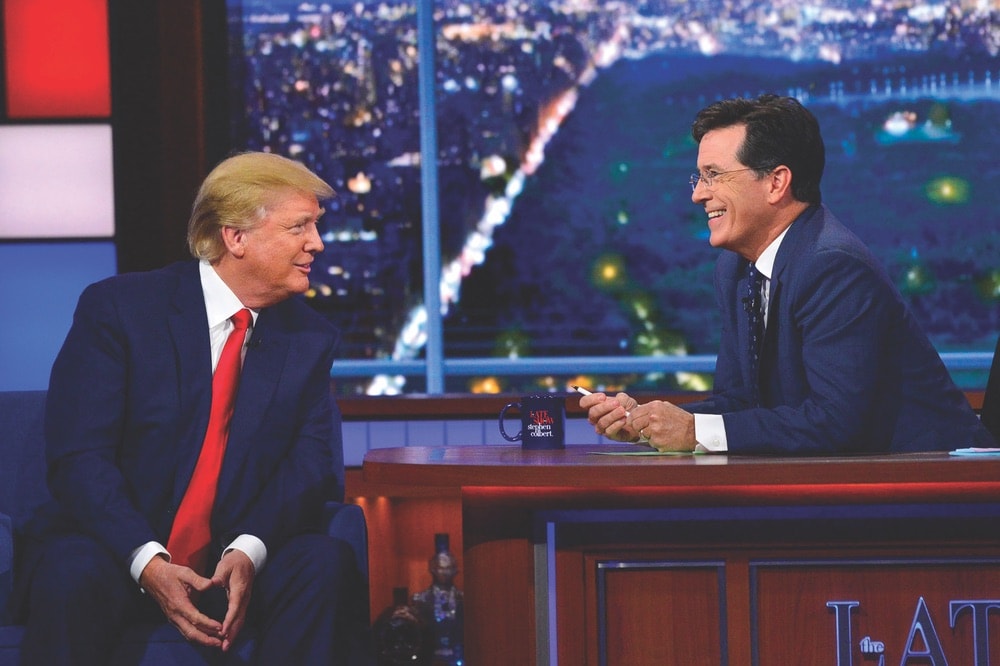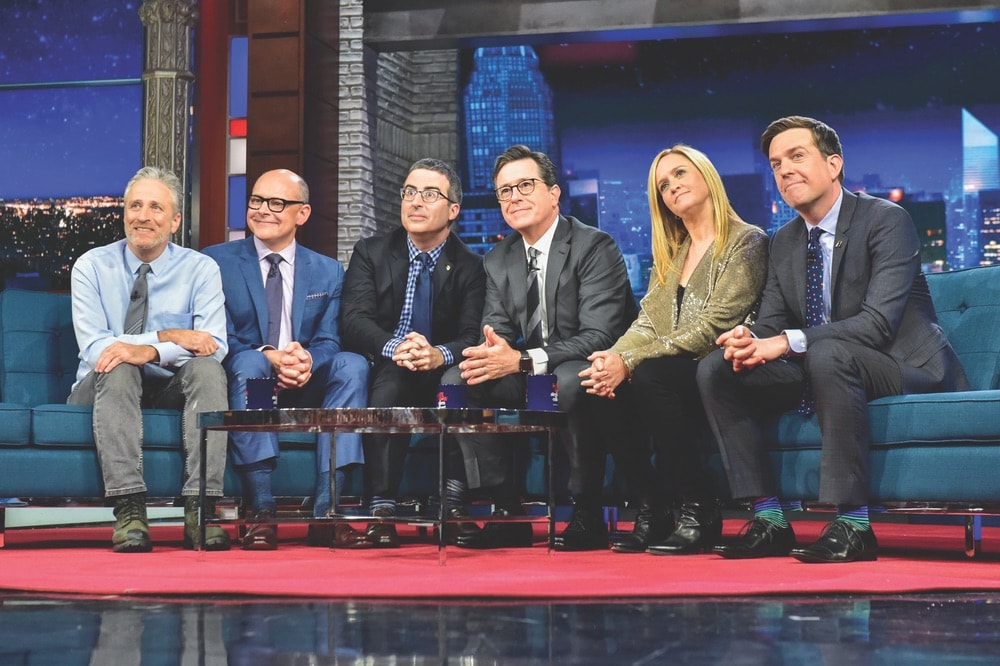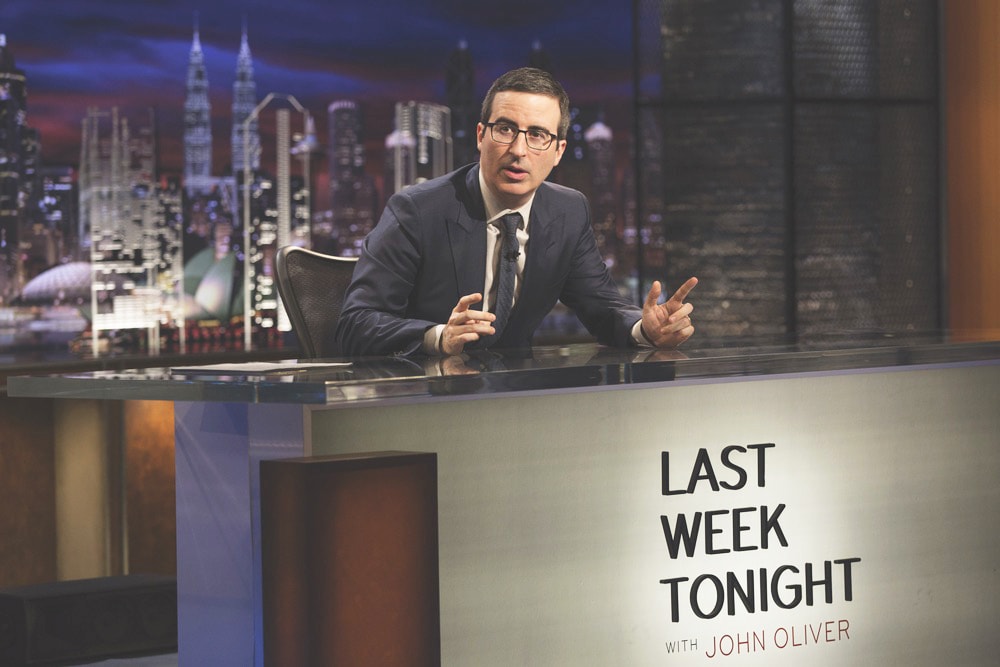
vie-magazine-make-america-laugh-hero-min
The Late Show with Stephen Colbert Photo by Scott Kowalchyk/CBS ©2017 CBS Broadcasting Inc. All Rights Reserved.
Late-Night Comedians Are Making America Laugh Again
A Commentary by Barbara Lippert
One of the more mind-blowing nuggets that author Michael Wolff fired off in his recent blockbuster book, Fire and Fury, is that aside from the now-banished Steve Bannon, no one on Trump’s political team thought he’d win the election. Wolff posited that in the mixed-up world of Donald Trump, his presidential campaign was an elaborate act undertaken in the hopes of losing so as to reap postelection rewards for his brand and far-flung empire. In true Trump style, however, our president has since gilded that lily, and now refers rather grandly to his shocking electoral sweep as “the Victory.”
He was tweeting right up to the election that the system was going to be “rigged!”—perhaps to give himself some cover.
Since then, we are the ones who need cover.
Trump’s binary presidency—a pinging and ponging of warring beliefs, messages, and tweets—has brought much cultural fracturing. Every utterance drives an already polarized nation further into opposing camps. Unlike that old Miller Lite beer ad, which had people on differing sides screaming, “Tastes great! / Less filling!” we now have a population that reflexively sees things as fake or real, pro or anti; and it’s a lot less fun.
Indeed, post-Trump, the political climate has become so pitched and adversarial that we’re losing the ability to speak civilly to one another. For the last eighteen months or so, people have been reporting that the ramped-up level of general antagonism is killing their sleep, diets, teeth, skin, family gatherings, and even long-standing friendships.

Donald Trump talks about his US presidential campaign on The Late Show with Stephen Colbert, Tuesday, September 22, 2015.
Photo by John Paul Filo/CBS ©2015 CBS Broadcasting Inc. All Rights Reserved
And, just as Trump never “pivoted” to what most people consider presidential, his “stable genius” level of media manipulation, unique among presidents, is one of the biggest causes of anxiety in America.
Every day, it seems, our first-ever reality-star president creates a meteor-sized media boulder that he himself packs, rolls, throws, watches to see how it plays out, and then reloads, to generate a massive self-perpetuating cycle: A Trump news-bomb cyclone.
Add to that the Trump-reactive reinvigoration of deeply reported newspaper stories, now amplified by the juiced-up cable and online news outlets (all magnified on social media) and the anxiety avalanche keeps growing. Trump has created so much cognitive dissonance around the idea of “fake” that, ironically, people are trusting comedy (crafted by writers who endow the riffs with history, context, and satire) more than the news. For a nation in need of anxiety blankets, it makes sense that late-night comedic institutions like The Late Show and Saturday Night Live—sometimes watched while huddled under a duvet—have provided new comfort zones. It’s no secret that in Trumplandia, these shows now function less as classic entertainment and more as a release valve for collective venting.
James Andrew Miller, the coauthor of Live from New York: An Uncensored History of Saturday Night Live, agrees that NBC’s SNL now acts as a “coping mechanism for the country.”
He explains that the iconic sketch-comedy program has always been part of the political process, with candidates like Trump, Obama, and Hillary Clinton hosting the show in the past. “The DNA of SNL is inextricably linked to politics,” he tells me. The difference now, he says, is that “it’s part of the news.”

Guests Jon Stewart, Rob Corddry, John Oliver, Samantha Bee, and Ed Helms, join Stephen Colbert on The Late Show, Tuesday, May 9, 2017.
Photo by Scott Kowalchyk/CBS ©2017 CBS Broadcasting Inc. All Rights Reserved.
Of course, the Trump persona remains a panacea for comedians in general, but Miller explains that this moment is particularly rich for the SNL writers: “They’d been in the desert for eight years with Obama,” he says. “He’s difficult to get a handle on or impersonate. No tics. Not a lot of drama.” So, Trump “was like a giant Christmas gift delivered to the door. The question becomes, ‘How often do you go to the well?’”
Miller adds, “You can’t hit a single or a double. The other thing that Lorne (SNL executive producer Lorne Michaels) talks about is ‘saturation.’ These sketches go out, and in a nanosecond, they go online.”
Certainly, SNL has ably spun several members of the Trump crew into comedy gold. (Melissa McCarthy as the podium-driving Sean Spicer comes to mind.)
In some ways, Alec Baldwin’s blistering portrayal of Trump as impulsive, childish, and soon to go over the edge has become larger than life, larger than Baldwin, and larger than SNL itself as an antidote to the times.
In turn, comedy gold has produced much-needed ratings gold for the forty-three-year-old show. Viewership for the series rose by more than 30 percent over the previous season, reaching heights it hasn’t experienced since the early days of the Bill Clinton White House.
Miller says, for SNL, it’s “one of those moments where the planets align. But the bar keeps getting higher. You have to keep meeting expectations. You don’t want to cry for the writers, but it’s a blessing and a curse.”
In some ways, Alec Baldwin’s blistering portrayal of Trump as impulsive, childish, and soon to go over the edge has become larger than life, larger than Baldwin, and larger than SNL itself as an antidote to the times.
Kurt Andersen, novelist and host of the Studio 360 radio show, is something of a Trumpologist. He cofounded Spy magazine in 1986, and the publication famously crowned our president—back when he was just a media-obsessed boy tycoon—with the multipart descriptors “short-fingered vulgarian” and “Queens-born casino operator.”
With Alec Baldwin, Andersen wrote the recently published bestseller You Can’t Spell America Without Me as a memoir (with photos!) in Trump’s voice, which he admits was hard to do, given that “you could just do it verbatim.”
He says that as a person, Trump essentially hasn’t changed since those 1980s prebankruptcy days, but the context he operates in certainly has, and Andersen finds that “terrifying.”
About Alec Baldwin’s version, he says, “His portrayal of Donald Trump has some cathartic, consoling effect. I think that’s true of well-done satire in general at a time like this.”
Andersen brings up the “two different issues” of satire used as consolation and the question of “whether satire affects things. You can say, maybe, maybe not.” But he says one thing that gets a bad rap is “preaching to the choir. Well, the choir needs to be preached to, but not in an end-of-America, end-of-democracy way.”
Indeed, no one has profited from a “Trump bump” more than Colbert, whose ratings started to shoot up as soon as he returned to revealing a political orthodoxy and made the Orange One his obsessive focus as a late-night opener.
He mentions Stephen Colbert (of The Late Show with Stephen Colbert) as the perfect embodiment of that new satirical high priest. “I don’t know what it does for Stephen Colbert to talk about Donald Trump,” he says, “but it does please and soothe me.”
Andersen is not alone.
Indeed, no one has profited from a “Trump bump” more than Colbert, whose ratings started to shoot up as soon as he returned to revealing a political orthodoxy and made the Orange One his obsessive focus as a late-night opener.
As with other politically inclined comedic TV hosts, such as John Oliver and Samantha Bee, Colbert got his start as a correspondent on Comedy Central’s The Daily Show with Jon Stewart, which became a clearinghouse for superstar comedic talent. Turning traditional TV news programming on its stiff, overly blow-dried head, Stewart brought a whip-smart, eviscerating take to everyday reporting. He regularly called his satiric bits “fake,” but even then, a younger, more digital generation recognized that what he was doing was somehow truer than what other news outlets were presenting, and they chose The Daily Show as their single filter.
In 2005, Colbert graduated to his own show on Comedy Central, The Colbert Report, playing a caricature of a reactionary, right-wing, hugely self-regarding pundit, somewhat in Bill O’Reilly mode. The role brought out his monster talent for parody and satire, so much so that in late 2014, CBS announced that Colbert would succeed David Letterman as the host of The Late Show. The Late Show with Stephen Colbert debuted in September 2015 with great anticipation.

Last Week Tonight with John Oliver is HBO’s comedic news series recapping worldly events and politics each Sunday.
Photo by Eric Liebowitz/HBO
Now effectively naked, however, without the protective cover of that ridiculously pompous character to play off, Colbert couldn’t quite find his footing, and the show and its ratings were flailing.
That changed in 2016, when Colbert started devoting his opener to filleting Trump (and Melania). The ratings ticked up by 35 percent in 2017.
“I think having somebody do what Colbert does, night after night, pitched perfectly and brilliantly, pretty vicious and funny, is kind of important,” Andersen tells me. “Maybe it’s our version of World War II–era USO shows. Not to dramatize that we’re fighting a war, but it’s good.”
Two years ago, during an unguarded moment at a tech and media conference, CBS head Les Moonves mused that the presidential race starring Donald Trump “might not be good for America, but it’s damn good for CBS.”
“I’m going to win another four years … because newspapers, television, all forms of media will tank if I’m not there … without me, their ratings are going down the tubes.”
He later backtracked to say he was “joking.”
But that’s the thing about the Donald—he’s hyperaware of what he brings to the table. In a recent interview at Mar-a-Lago with New York Times reporter Michael S. Schmidt, Trump made a clear-eyed statement: “I’m going to win another four years … because newspapers, television, all forms of media will tank if I’m not there … without me, their ratings are going down the tubes.”
He’s got something there, which suggests that he’ll continue to create, amp up, and reload the news-bomb cycle, thus ensuring the continued need for late-night TV to step up its counter-therapy in response. It’s been dubbed “resistance comedy.”
Or as Andersen put it: “There are millions of people who feel undone and discombobulated by this president and need that reassuring sense that there are other people freaking out, too.”
— V —
Barbara Lippert writes about media, politics, ads, and women. Currently, she’s a columnist for Ad Age; previously she wrote Mad Blog for MediaPost.com, which started out as an episode-by-episode deconstruction of Mad Men. For many years she was an award-winning ad critic for Adweek and has also written for New York magazine, Vogue, Glamour, Newsweek, the Washington Post, and the New York Times. She lives in New York City.
Share This Story!
KEEP UP WITH THE LATEST STORIES FROM VIE
















































































































































